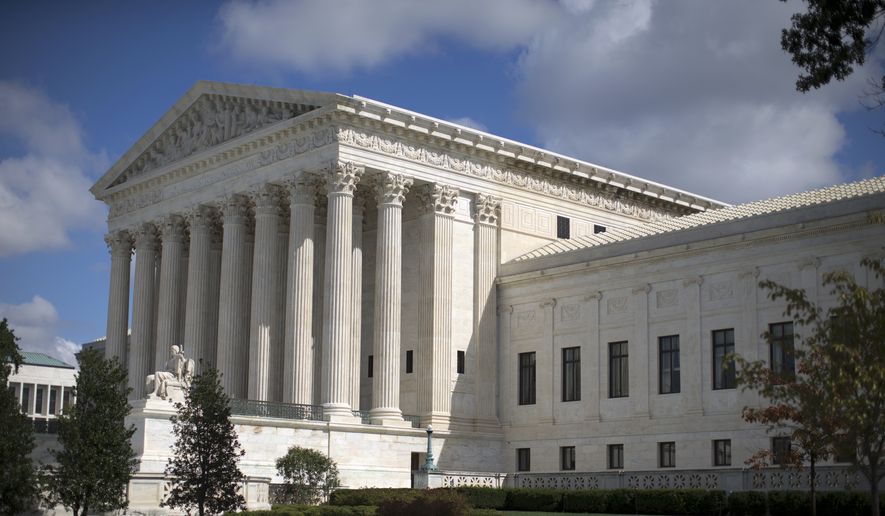Democrats say Americans’ access to Obamacare is at risk with the next Supreme Court justice, though some legal experts say they’re exaggerating the issue to try to defeat President Trump’s eventual nominee.
Senate Minority Leader Charles E. Schumer and his troops don’t have the votes to stop Mr. Trump’s nominee, but they are eager to use the pick for political purposes, hoping to rally liberal voters ahead of November’s elections and perhaps make life uncomfortable for several centrist Republicans.
While abortion and the 1973 Roe v. Wade ruling have taken most of the focus, Democrats insist the next justice could play a deciding role in striking down the Affordable Care Act should another case reach the high court, even though the retiring Justice Anthony M. Kennedy had already voted to strike it down.
Protect Our Care, a pro-Obamacare coalition, released a TV ad on Monday driving home that message.
“This is the emergency: It’s up to us to stop them,” says the ad, which will be tailored to Republican swing votes — Sens. Susan Collins of Maine and Lisa Murkowski of Alaska — in their home states.
The court upheld most of Obamacare in 2012 in a 5-4 ruling, but a new legal challenge says now that Congress repealed the individual mandate as part of last year’s tax law, the rest is legally suspect.
Justice Department lawyers agreed with that legal stance, and said they won’t defend the law in the courts.
But Justice Kennedy wasn’t part of the 2012 case majority — the key swing vote in the 2012 Obamacare case was Chief Justice John G. Roberts Jr., who sided with the court’s four Democratic-appointed members.
Legal experts doubted a new justice will change that.
“There’s nothing in Roberts’ record to suggest he’d be remotely sympathetic to the arguments made by Texas and the DOJ,” said Jonathan Adler, a law professor at Case Western Reserve University who spearheaded a previous Supreme Court showdown against Obamacare but says the latest case is bogus.
Mr. Adler signed onto a legal brief that says Congress in 2017 clearly intended to zero out the penalty for lacking insurance as part of its tax-cut bill, while leaving in place the parts requiring insurers to cover sicker Americans and charge them the same price as healthy people.
Abbe R. Gluck, a Yale law professor who cosigned the brief, said Chief Justice Roberts and other justices are experts in “severability” — the legal doctrine that dictates which parts of a law can survive separately.
“I would be very concerned about a potential nominee who couldn’t be trusted to apply settled law faithfully, and I hope that’s not the kind of nominee we get from the president,” she said.
Timothy Jost, an emeritus law professor at Washington and Lee University who closely tracks the Obamacare debate, said he has “no idea” how Chief Justice Roberts might rule, though he believes there is only one option.
“The lawsuit is laughable, and I would hope that Chief Justice Roberts would see this — if it gets to the Supreme Court,” he said.
Mr. Schumer says Democrats can’t take any chances. The specific question around severability at this juncture in Obamacare’s history hasn’t been tested — so in his view, the chief justice’s ultimate position is as an open question.
“If the change in the law changes Justice Roberts’ mind, which is very likely, and the new jurist is as biased against our health care system as President Trump said he or she will be, millions of Americans could see their preexisting conditions protections wiped out,” Mr. Schumer said.
And even if this lawsuit fails, Mr. Schumer thinks another one will come along.
His strategy is also just Politics 101 — much as immigration is animating the GOP base, Democrats are fired up over health care heading into November’s elections.
“He is, without question, trying to pull every lever to fire up the Democratic base ahead of the midterm,” said GOP strategist Ford O’Connell. “He’s also, interestingly, trying to turn the heat up on Collins and Murkowski — because if they bless the nominee, this is over.”
• Tom Howell Jr. can be reached at thowell@washingtontimes.com.




Please read our comment policy before commenting.